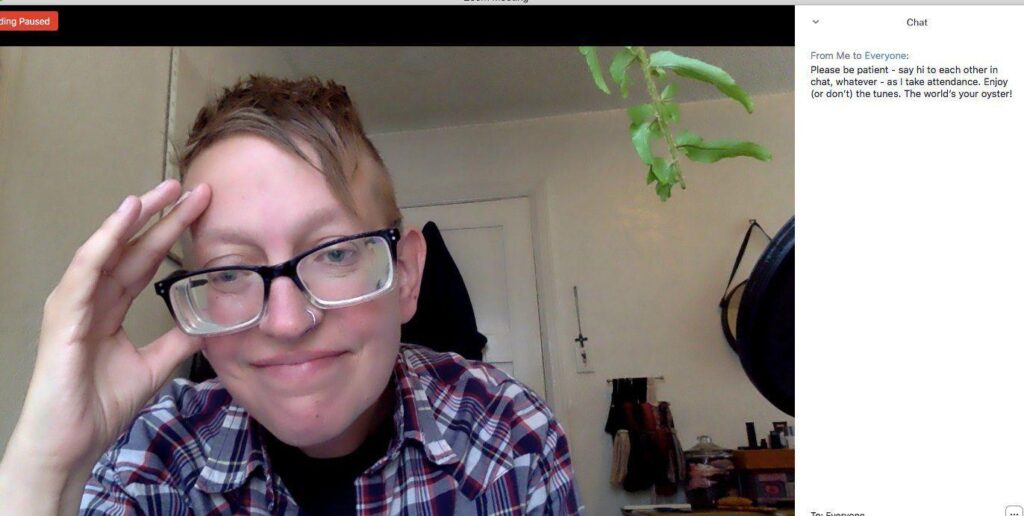
Toward winter’s end, it became difficult to listen to music. My world and the whole damn world had changed, was changing, so rapidly. Music, which has brought me comfort in some of my darkest hours, just wasn’t cutting it—every song a reminder of a life before. Even the songs I heard for the first time last September, when we took the kids on a trip to Los Angeles—like Nicki Minaj’s “Roman Holiday” (thanks, Carson)—were too painful. We stayed together, teachers and students, in an AirBnb. We shared bathrooms, we went to crowded museums and body-to-body spoken word events, we ate at small, warm restaurants and we all rode together from Flagstaff to LA and back in a van exchanging air.
Even that world, the one of September, no longer exists.
About a month before the school year began, my friend Kirk made me a Spotify playlist of Indie Manchester music from the ‘90s. That decade was an overall good time in my life (just the usual bumps and scrapes of growing up). The ‘90s felt—politically, socially, technologically, intellectually, artistically, musically—so rife with possibilities. Nirvana, Riot Grrrl, the Women’s Conference in Beijing where Hillary Clinton said, “Human rights are women’s rights and women’s rights are human rights.” Promising treatments for HIV/AIDS were beginning to take hold.
I was 24 when the new millennium hit. Maybe everything seems rife with possibility when you’re 24.
Now it’s 2020, we’re in quarantine (or something like it), I have cancer and all the classes I used to teach in a classroom are now on my computer in our small spare room.
Can I do this? Will it be too painful? I had these questions about both teaching online and Kirk’s playlist—one that would no doubt launch me back to memories of a simpler time.
The playlist, as it happened, wasn’t painful at all. On the contrary, instead of bringing me back to memories from my youth (“that time I had an embarrassing crush on X” or “that time I got too stoned” or “that time we ransacked the post-lecture buffet because we were poor”) I began making new memories to the songs (“that time I read parts of the Old Testament for teaching Angels in America” or “that time Abe and I were walking after the rain and I later fell in the puddle I discouraged him from jumping in” or “that time when it felt like the whole world was ending, but I was happy because I saw the possibility for a revolution”)—the possibility to glance back, take only what is good, what we need from that old world, and move ever forward.
The first time going back to my classroom, on the other hand, felt like walking into a tomb, and I wept. Time had frozen. My kids had disappeared. Empty desks, a pile of books left just as they were when we began spring break, student art on the walls—almost frightening in the heavy absence of bodies and voices. Subsequent visits never feel normal, but they’re less scary and hurtful, as is true with all protracted life events that are, upon arrival, exquisitely painful.https://d50d07974324c1ab04575d321f749341.safeframe.googlesyndication.com/safeframe/1-0-37/html/container.html
As I began to prepare for the alien nature of online teaching, I considered what was essential now. What did my students need the way they need food and water? (I am reminded so often, these days, of Coleridge’s “Water, water everywhere/nor any drop to drink.”) I came to the conclusion that students need connection, educational and experiential opportunities that refresh them, cleanse them, nourish them—as does water.
Of course there’s always the doubt. Who am I to be the arbiter, for my students, of what they need? But I am not acting as arbiter. In fact, now more than ever students need to be part of creating the courses they take. They need agency and voice in a world that seems only able to manage faint utterances of “quiet” and “no.” This year, I really want my students to understand that they can ask “Why?” and “To what end?” And that they can steer the academic, creative and intellectual direction we take. (I do reserve the right to say, “no,”—a privilege I have earned after spending almost half of my life in this profession.)
Among the songs on Kirk’s Spotify was the achingly haunting “Isolation” by Joy Division, a song that sent me into a spiral, a kind of time warp, of Joy Division’s entire brief catalogue.
First day, first class—AP Literature. I played Joy Division for my students while I took attendance. “Digital” was the first song on the playlist I’d made for this occasion. In their little Zoom squares, I saw a few heads bobbing. The simple, goth-punk lyrics to “Digital” feel fresh, and not just the title but the repeated phrases: “I feel it closing in” and “day in day out”—the monotony that follows the hunch that something is closing in, unknown whether the “something” is desirous or dreadful, feels almost too on the nose. https://d50d07974324c1ab04575d321f749341.safeframe.googlesyndication.com/safeframe/1-0-37/html/container.html
But then there’s the song’s final refrain: “Don’t ever fade away.” Many a rock band before and since Joy Division has implored us ‘tis better to burn out than fade away, but in Ian Curtis’ mouth, the lyric sounds like an agonized, urgent plea.
It’s so easy to disappear into the convoluted tapestry of this moment in history, to get quiet, to turn off, to go inside. To fade away.
Last week, I saw something beautiful on Zoom (which I sometimes call “Gloom” only because I loathe the truth it represents): I saw bright young people who were awake, smiling, ready-for-their-close ups at 8:45 a.m. People can talk down about “today’s youth” all they want, but I have the good fortune to know what beautiful, resilient creatures they are. And yes, they are confused (who isn’t), but they are optimistic because they know what some of us older folks have forgotten: optimism is the only choice. Not idiotic “I don’t follow politics because it makes me sad” cowardice, but the kind of optimism that pays attention. The kind of optimism that turns around and says, “How did that work out for us? What should we get rid of? What should we bring in the move?”
My students don’t want their futures or their country to fade away, they only want the rest of us to glance back, look forward and change accordingly. (They also still sometimes show up late, send me memes, groan at my “teacher jokes.”) They’re definitely not fading away. So if you need some inspiration, look no further than the kids in our community, and if that doesn’t work, you can always heed the advice of a Manchester goth-punk singer from the early ‘80s: “Don’t ever fade away.”

